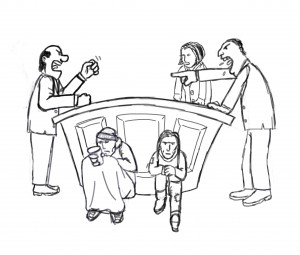
Preparation for the City Council’s monthly meeting begins at the Civic Offices on Wood Quay.
Once inside, you travel to the third floor and reach the glass encaged offices of the City Manager. On the left is a table with some brochures and old magazines; to the right the glass looks over a grand open area. On this particular day, the Council is in the process of printing the agenda for the next meeting
“We have deadlines all the time. Each Councilor is allowed submit four questions. I have a staff members who take the questions, get them into a document, co-ordinate the replies, make sure they’re suitable, and answer what the Councilors asked,” says one of Dublin’s City Council’s administrative officers- who refused to be named for this piece. What happens here determines both what will be discussed at the Council meeting, and the length it will take.
Over City Hall, it’s hard to believe that 52 Councilors can fit into such a small confined space. When you enter the main debating chamber, the media are on the left, the Councilors form a ring around the administrative staff, including the person we spoke to, the Lord Mayor, and the City Manager.
The Council meeting starts just after six and continues until ten. Sitting right next to me are staff from The Irish Times, The Herald, and RTE. At one point the Times’ man turned to me and asked what had just been said with a puzzled look on his face. This happens a lot in the media pen; fellow journalists pass information and documents to each other in a bid to get the best story. Opposite us, the Councilors, all well dressed, articulate language that at times can be confusing. They all have their own interesting story, having seen their fair share of adversity, and having battled long and hard to get to where they are.
“Very little work actually gets done, because an awful lot of Councilors use it as an opportunity to grandstand and to make noise,” says Fine Gael Councilor Kieran Binchy. “If I was a member of the public watching one of our Council meetings on the webcast, or in person, I would seriously question how our taxes are being spent.”
Over on the middle row, is Christie Burke who offers words of wisdom when the meeting gets out of hand. If this were a circus, he would be the ringmaster, keeping everyone in check. Fine Gael is represented quite well, but Dr. Bill Tormey stands out as the most vocal. At a recent debate about gay marriage, he made a speech concerning a mash of issues in one; it lacked any substance- the Council eventually voted in favor of supporting gay marriage- much to Tormey’s reluctance. Labour has always held a strong lead at these meetings with members attempting the awkward balancing act of a party who are firmly in Government. Fianna Fail, a member of Eirigi- a socialist republican party- a few independents, People Before Profit, and Sinn Fein make up the chamber.
After speaking to several Councilors, it’s clear that the debating style and use of legal language, an agenda that is the size of a telephone book, and heckling can be troublesome.
“There’s a lot of the shouting and heckling that go on is unnecessary, it doesn’t lend anything to the business of the evening and women generally don’t operate like that. It’s a male thing,” says Labour Councilor Gerry Ashe.
Another Labour Councilor, and brother of Ashe, Dermot Lacey, called a recent walkout by Sinn Fein “ignorant and deliberately designed to grab a headline.” Back at Wood Quay, the Administrative official points to the door and says “you can let yourself out.”
By Liam Cahill

